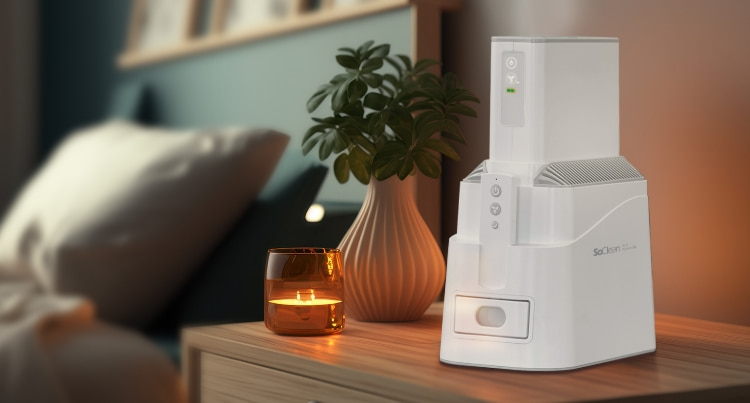Keep the air around you clean with the SoClean Air Purifier+.
Although sleep needs generally vary with age[1], experts recommend that adults typically need between 7 and 9 hours[2] of quality sleep each night. Good sleep is essential for many aspects of health[3] and well-being, including cognitive function, metabolic health, accident reduction and cardiovascular health. Furthermore, research indicates links between quality sleep and longevity[4]. However, despite the importance of sleep, around 1 in 3 American adults[5] report not getting enough high-quality sleep regularly.
There are several ways individuals can increase their chances of a good night's rest, such as making sure their bedroom is at the optimum temperature for sleep[6], reducing caffeine intake[7] in the afternoon, using sleep apps[8] and doing moderate exercise[9] each day. Managing pets[10], making sure the bed is comfortable, and organizing the bedroom[11] can also help people sleep better. A clean sleep environment is also essential for overall sleep hygiene[12]. This article looks at how cleanliness impacts sleep and provides tips for creating a healthy environment that is beneficial for sleep.
Links Between Cleanliness, Air and Sleep
A range of allergens, irritants and germs can often be found in the air, including pet dander, pollen[13], smoke, mold and diverse pollutants[14]. Some enter the home from outdoors, such as through open doors and windows, while others are already present inside your bedroom. Although people can't see harmful aspects in the air, they enter the body with each breath. It's particularly important to sleep in clean air; otherwise, individuals have around 8 hours daily of inhaling various allergens, pathogens and irritants, which can trigger diverse long- and short-term health conditions. Moreover, the symptoms of health issues can cause discomfort, affecting sleep.
Common symptoms to allergen, pollutant and germ exposure include headache, runny nose, itchy eyes or skin, congestion, coughing and sneezing, all of which can prevent a person from being able to fall asleep. Additionally, some conditions may cause an individual to wake up during the night and be unable to fall back asleep. Bad smells can also distract people from sleeping. In essence, poor air quality can reduce the quality of sleep.
How to Keep Your Bedroom Clean for Better Sleep
Regular cleaning is a crucial way to improve the air quality in a bedroom, not to mention that a clean and tidy room can enhance feelings of calm, which is also beneficial for good rest. Frequent dusting and vacuuming prevent dust from building up. Individuals can reduce the amount of outdoor pollutants from entering the bedroom by removing outdoor clothing before entering the room. Additionally, it's recommended to keep doors and windows closed on days when the outdoor air quality[15] is poor.
Regularly washing bedding, such as sheets[16] and pillowcases, reduces allergens and germs. It's also important to periodically replace pillows and mattresses, particularly if they're dirty or stinky. Dust mite covers can further enhance the hygiene of a bed.
An air purifier[17] can help make the bedroom's air fresh and clean. The easy-to-use SoClean Air Purifier+[18] uses a three-stage filtration process to remove allergens, germs, irritants and odors from the air. Indeed, the device is about 3,000 times more efficient than HEPA standards[19].
Ventilation[20] is important for good-quality air, too. When the outdoor air quality is good and has minimal allergens, throwing open the windows enhances air circulation and refreshes the indoor air. This can reduce stale and musty smells and prevent a build-up of carbon dioxide. Fans can also help to circulate indoor air.
Take steps to improve the air quality in your bedroom and keep your sleeping space clean and tidy to reap the benefits of better sleep each night.
References
- Centers for Disease Control and Prevention – How Much Sleep Do I Need?
- National Heart, Lung, and Blood Institute – How Much Sleep Is Enough?
- Journal of Clinical Sleep Medicine - Sleep is essential to health: an American Academy of Sleep Medicine position statement
- Siclen - New Research: Sleep Well to Live Longer
- Centers for Disease Control and Prevention – Sleep and Sleep Disorders
- Cleveland Clinic – What's the Best Temperature for Sleep?
- National Library of Medicine - Effects of caffeine on sleep quality and daytime functioning
- Siclen - Top Sleep Apps for Improving Your ZZ
- Healthline – 5 Reasons Exercise Improves Sleep
- SoClean – Pets in Bed: Pros and Cons for Sleep Quality and Health
- SoClean – Organize Your Bedroom for Higher Quality Sleep
- SoClean – Everything You Need to Know about Sleep Hygiene
- John Hopkins Medicine – Allergens: Pollen
- Centers for Disease Control and Prevention – Air Pollutants
- AirNow – Get air quality data where you live
- Cleveland Clinic – How Often Should You Wash Your Sheets (And the Gross Reasons Why)
- SoClean – 5 Major Reasons Your Home Needs an Air Purifier
- SoClean Air Purifier+
- United States Environmental Protection Agency – What is a HEPA Filter?
- ScienceDirect - Bedroom ventilation: Review of existing evidence and current standards





